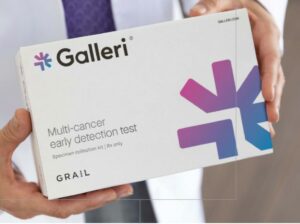Galleri Multi-Cancer Early Detection Test
What is Galleri Testing?
Beating cancer starts with knowing you have it. We're pleased to share that we are now offering the Galleri Multi-Cancer Early Detection Test which detects more than 50 types of cancer, including many not commonly screened for today.1,2 With a simple blood draw, the Galleri test can provide early detection insights that can help you be proactive about your health.

What are the benefits of the Galleri test?
Here are a few benefits of the test:
- It detects many cancers that are not commonly screened for today.
- It can be incorporated into a routine visit through a simple blood draw.
- If a cancer signal is found, the results point to where in the body the cancer is coming from to help guide your next steps.
When cancer is diagnosed early before it has had a chance to spread, the overall 5-year survival rate is 4 times higher than when it's diagnosed in later stages.3,4
The Galleri test is only recommended for use in adults with an elevated risk for cancer, such as those aged 50 or older. It is intended to be used in addition to, and not replace, other cancer screening tests.
To learn more about the test, please visit www.galleri.com.
If you are interested, I encourage you to call the office for information on the discounted cost, and schedule an appointment to discuss if the Galleri test may be right for you.
1. Klein EA, Richards D, Cohn A, et al. Clinical validation of a targeted methylation-based multi-cancer early detection test. Abstract LB013. Presented at the American Association for Cancer Research (AACR) Virtual Annual Meeting April 10 – 15, 2021.
2. Amin MB, et al. (Eds). American Joint Committee of Cancer (AJCC) Cancer Staging Manual (8th edition)
3. Modeled detection extrapolated to 2020 US population ages 50–79. Screening includes methods with United States Preventive Services Task Force (USPSTF) A, B, or C rating (breast, colon, cervical, prostate, and lung), and assumes screening is available for all prostate, breast, cervical, and colorectal cancer cases and 33% of lung cancer cases (based on estimated proportion of lung cancers that occur in screen-eligible individuals older than 40 years). Data on file from Surveillance, Epidemiology, and End Results (SEER) 18 Regs Research Data, Nov 2017 Submission. Includes persons aged 50–79.
4. Estimated deaths per year in 2020 from American Cancer Society Cancer Facts and Figures 2020. Available at:
www.cancer.org/content/dam/cancerorg/research/cancer-facts-and-statistics/annual-cancer-facts-and-figures/2020/cancer-facts-and-figures-2020.pdf
